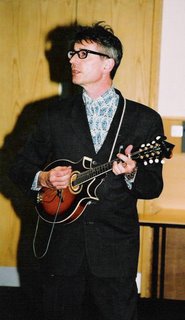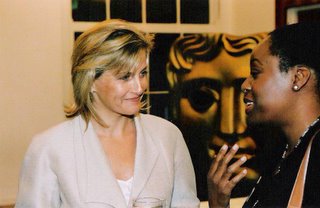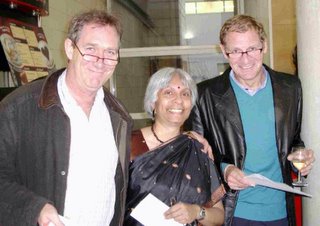CREATIVE
Text of a talk at the Qualification & Curriculum Authorities' seminar on English 21, a national discussion on the future of English, 9th November 2005.
What's creative? This is:
"Thinking
Is a beautiful use of a mind.
Our thoughts are bees
Buzzing in the hive of our head.
The bees visit flowers
Then return with ideas,
Stories of butterflies,
dogs, cats, rabbits and grass
Our blood runs like honey,
Sticky with thoughts."
This poem is from year 5, Kingsway Primary School, Wallasey. It’s quoted in Jean Sprackland and Mandy Coe’s book on writers in schools which is called ‘Our Thoughts are Bees’. it's simple, no reference to literary culture, no long words, no complex rhyme scheme or metric structure, no difficult ideas - but a stunning new poem, a real act of creation.
To be a good writer or any kind of artist or communicator, or someone who tells good stories or sends memorable e-mails, you need Competence, Cultural awareness and Critical ability. But to start with you have to do what these writers did: have the nerve to "create new meanings and make new effects", to make a fresh image, to shape words your own way and see what happens. To write things you yourself don't fully understand as you write them.
So what gives you that nerve? Well, often somebody gives it to you. Someone persuades you that you have that right and that potential. Often it’s a teacher. David Almond said:
"I’ve seen some stunning work done and it just emphasizes how I feel about teachers today, they’re just fantastic and compared to teachers when I was at school are just amazingly creative."
Sometimes it’s not. The poet Michael Donaghy wrote, “I started a PHD in English because I loved poetry, which I now realize is like saying I studied vivisection because I loved dogs.”
And lots of people talk about how education can crush the life out its subjects. It’s a serious charge levelled at schools today, in the age of attainment and measurement, with so much emphasis on what exactly each unit of work is FOR – that there’s no space left for free creativity.
So how do you defend that space, and generate that creative spark?
Often it’s a one-off satori-like experience like… going to the theatre and suddenly a whole world of possibilities opens up.
(At an Arts & Kids event film Australian film director Baz Luhrmann talked about seeing Shakespeare in a little town in the middle of nowhere and how it blew his mind. Then Prince Charles said he grew up in a big house in the middle of somewhere and saw Shakespeare with his granny and it changed HIS life too).
For me a drama group I was part of as a teenager was fantastically liberating- it felt too good to be true: to attend a drama workshop with actors who give young people permission to play about and make believe, and takes their actions and inventions seriously.
Of course reading is a creative activity in its own right, and at the core of building a creative sense of self. Freedom and the information yo need to find the books that inspire us is vital, but the kickstart to creative writing is often to meet a creative writer.
Now, it’s not just creative writers who are creative, (and they can be uncreative too at times!), but writers, dramatists, actors are uniquely involved in making the imaginary - telling new stories. It can be life changing to actually meet a writer, like for instance - to pluck one name from the pool of diverse and brilliant writers who work with children - John Hegley, performance poet, and musician. A trickster, punster, wise cracker, rule breaker. He’s very funny, but also kind of cool, and very moving on the topic of growing up a glasses wearer, very honest about his time as a school bully. He’s a personality (but not a glitzy celebrity) who says all things are possible with words.

A visiting writer reading from their own book brings the whole library alive, makes children long to get to grips with how grammar and spelling can be used like glue and string to build your own word-things.
We all know this, but do all children?
As part of English 21, Booktrust got together with a range of literature organizations – like the Poetry Society, Apples & Snakes, NAWE, The Arvon Foundation… to look at the idea of a creative entitlement. Could we pin down the key opportunities children need in order to open them up to their potential for creativity?
Our first version was a list of activities, from reading whole books to having a writer visit the school - things we thought should happen to every child as they go through school.
THEN we sent it out to all and sundry: writers, organisations, teachers.. There was widespread approval of the general idea.. but lots of minor suggestions. For instance writer Eva Salzman said “I can't imagine not thinking this Entitlement idea a good one! I was glad to see the mention of theatre, and related activities. being a cross-arts sort of person, I've worked with children in galleries or museums a lot, so was wondering if or how this might figure”
Those responses have led us to reshape the document – trying to pin down the key elements of the entitlement in reading, drama and writing. Here's the latest version.
A Creative Entitlement for the Classroom
_______________________________________
Imagination and creativity are at the heart of English. Children are entitled to experience and develop creative uses of language through reading, drama and writing. Some of this can happen as part of normal classroom work, but wider opportunities stem from partnerships beyond the school. These will enable children to involve themselves fully in the world of words as readers and writers, and by taking part in drama.
Children are entitled to:
• discover and rediscover the pleasure of reading through responding imaginatively to great books, stories and poems
This means children should, from their earliest years, hear stories read aloud and regularly read whole books purely for enjoyment. They should be able to choose books that interest them and discuss the reasons why.
• enter with confidence the world of books and culture, becoming part of the community of active and creative readers
This means that children should meet and talk with writers and readers, visit public libraries, bookshops and literature venues, participate in book groups. They should be involved in projects - like National Children’s Book Week and National Poetry Day - which inform and inspire reading.
• share the experience of live theatre, being caught up in the ways words, actions, music and staging combine to create unique dramatic moments
This means that children should regularly go to the theatre, see street performances, and participate in Theatre in Education in school.
• explore and expand ways of expressing thoughts and feelings in words and actions through improvisation and performance
This means children should participate actively in drama workshops and discuss with actors, playwrights and directors the impact and meaning of different ways of performing and staging drama.
• try out many ways of discovering and shaping their own meanings, seeing written language as a fascinating resource for expressing thoughts and feelings
This means children should work in sustained and practical ways with writers to learn about the art, craft and discipline of writing.
• share their words with confidence
This means that children should see their own and each other’s work presented through publication, display or performance, voice their own thoughts and hear the reactions of responsive readers.
__________________________________________________
Let me know what you think. These documents are hard. How do we make it strong enough without sounding bossy? This isn’t a wooly menu of options, we intend it to be a requirement for schools. And it’s not just for the enthusiasts - it’s for all.
So why is this important? For literature organisations I think it's revolutionary.
All of us do projects with schools, produce resources to schools - at Booktrust we run Children's Book Week and the wonderful (and free) www.booktrusted.com website for teachers. But those activities can feel like drops in an ocean that’s hard to fathom when we’re bobbing about on the top of it.
Through the WRITING TOGETHER alliance, literature organisations have been speaking a lot more with DfES and QCA. The evidence is that many perfectly competent schools still would not think of bringing in writers or theatre companies.
Armed with this entitlement we can work as a sector with schools across the UK, tailoring our activities to help schools meet their responsibilities. We can debate together how best we can deliver the entitlement. We have a clear role with clear benefits for those we work with.
At the meeting with literature organisations, people started off a bit dismissive.
“Yes, but these things happen in most schools!” We had the QCA on hand to say that well, maybe they don’t .
The organisations said, “Can’t we make a more radical manifesto?”
Yes we can. And we will. That’s the next stage. But this isn’t it.
The entitlement needs to be manageable, feasible within existing resources.
So why is creativity imortant for children?
Lots that we learn from school prepares us for the future, equips us to make a success of ourselves in later life. And of course the business world is crying out for creativity of the flipchart and brainstorming variety. The authors of ‘Our Thoughts aree Bees’ will be good at that.
But creativity is also what makes whatever life we lead worthwhile. It helps us make connections, tell stories, share jokes, find interest wherever we look, express ourselves freely.
An author describes the pleasure of working in schools, of "days when the formal classroom dissolves away,
because the whole group is enthusiastically engaged… it becomes a group of eager, self-motivated, curious, exploring writers."
Creativity is absolutely vital to self esteem which is vital to being alive.
Schools have a responsibility to encourage all children not just to learn about the real world but to make up worlds of their own. As William Blake said, “I believe a person may be happy in this life and that this is a world of
Imagination & Vision.


